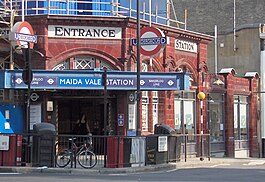Maida Vale is a London Underground station in Maida Vale in inner north-west London. The station is on the Bakerloo line, between Kilburn Park and Warwick Avenue stations, and is in Travelcard Zone 2.
| Maida Vale | |
|---|---|
 | |
| Location | Maida Vale |
| Local authority | City of Westminster |
| Managed by | London Underground |
| Number of platforms | 2 |
| Fare zone | 2 |
| London Underground annual entry and exit | |
| 2019 | |
| 2020 | |
| 2021 | |
| 2022 | |
| 2023 | |
| Railway companies | |
| Original company | London Electric Railway |
| Key dates | |
| 6 June 1915 | Opened |
| Listed status | |
| Listing grade | II |
| Entry number | 1066834[6] |
| Added to list | 26 March 1987 |
| Other information | |
| External links | |
| Coordinates | 51°31′47″N 0°11′08″W / 51.529785°N 0.185565°W |
The station is a Grade II listed building being of architectural and historic interest. In 2009 the station won a National Railway Heritage Award, in the London Regional category, for the successful modernisation of a historic station.[7]
History
editA proposed 1908 extension of the Bakerloo Line had envisaged a stop at nearby Abercorn Place but this route was rejected. Maida Vale opened on 6 June 1915 on Bakerloo tube's extension from Paddington to Queen's Park five months after the extension.[8] At the time, it was the first station to be entirely staffed by women.[9] The women continued to work at the Maida Vale station until 1919 when servicemen returning from the war displaced them. The outbreak of World War II again opened up jobs for women. On 6 June 2015, the station celebrated its 100th anniversary as part of the 100 years of women in transport campaign.[10]
Location and layout
editThe station is located at the junction of Randolph Avenue and Elgin Avenue and has a surface building designed by Underground Electric Railways Company of London's architect Stanley Heaps. He used a standardized design that appears in many station buildings under control of UERL whilst Maida Vale was provided with buildings in the style of the earlier Leslie Green stations but without the upper storey, which was no longer required for housing lift gear. It was one of the first London Underground stations built specifically to use escalators rather than lifts.[11]
Transport links
editBus routes 16 and 98, and Night Bus routes N32 and N98 serve Maida Vale road, a short distance to the north-east.
In popular culture
editThe station surface building and the distinctive staircase mosaics feature in Alfred Hitchcock's 1927 film Downhill, as well as the 1983 film Runners, written by Stephen Poliakoff. Both films feature shots down the escalators, those in the earlier production being the original wooden versions.
The exterior was used for a scene in the 1974 film adaptation of the popular British television situation comedy Man About the House.
A scene shot at platform level—complete with arriving train—appears in the video for The Chemical Brothers' single Believe (2005).
Maida Vale tube station also features in a montage of scenes in the 2013 Richard Curtis film About Time, where the two main characters enter and leave the different platforms via the escalators.
In the 2014 film Paddington, the exterior was used to depict the fictional 'Westbourne Oak' station, an amalgamation of the nearby Westbourne Park and Royal Oak stations. Interior scenes filmed at nearby St John's Wood Station.
Gallery
edit-
Sign on the main road for the station
-
Northbound platform view
-
Mosaics over the concourse entrance
References
edit- ^ "Station Usage Data" (XLSX). Usage Statistics for London Stations, 2019. Transport for London. 23 September 2020. Archived from the original on 9 November 2020. Retrieved 9 November 2020.
- ^ "Station Usage Data" (XLSX). Usage Statistics for London Stations, 2020. Transport for London. 16 April 2021. Retrieved 1 January 2022.
- ^ "Station Usage Data" (XLSX). Usage Statistics for London Stations, 2021. Transport for London. 12 July 2022. Retrieved 7 September 2022.
- ^ "Station Usage Data" (XLSX). Usage Statistics for London Stations, 2022. Transport for London. 4 October 2023. Retrieved 10 October 2023.
- ^ "Station Usage Data" (XLSX). Usage Statistics for London Stations, 2023. Transport for London. 8 August 2024. Retrieved 16 September 2024.
- ^ Historic England. "Maida Vale Underground Station (1066834)". National Heritage List for England. Retrieved 3 April 2015.
- ^ "Christmas comes early to Maida Vale Tube station" (Press release). Transport for London. 4 December 2009.
- ^ Rose, Douglas (1999). The London Underground, A Diagrammatic History. Douglas Rose/Capital Transport. ISBN 1-85414-219-4.
- ^ The Times, 7 June 1915, p. 5
- ^ "Maida Vale Tube station celebrates 100th anniversary". tfl.gov.uk. Transport for London. 5 June 2015. Retrieved 14 July 2017.
- ^ The first escalator on the Underground was installed at Earl's Court in 1911. The first station built specifically for escalators was the new Central line station at Liverpool Street in 1912. All deep-tube stations built after 1913 were built with escalators – Wolmar, Christian (2004). "Beginning to Make Sense". The Subterranean Railway: How the London Underground Was Built and How It Changed the City Forever. Atlantic Books. pp. 205–206. ISBN 1-84354-023-1.
External links
edit| Preceding station | London Underground | Following station | ||
|---|---|---|---|---|
| Kilburn Park towards Harrow & Wealdstone
|
Bakerloo line | Warwick Avenue towards Elephant & Castle
| ||
